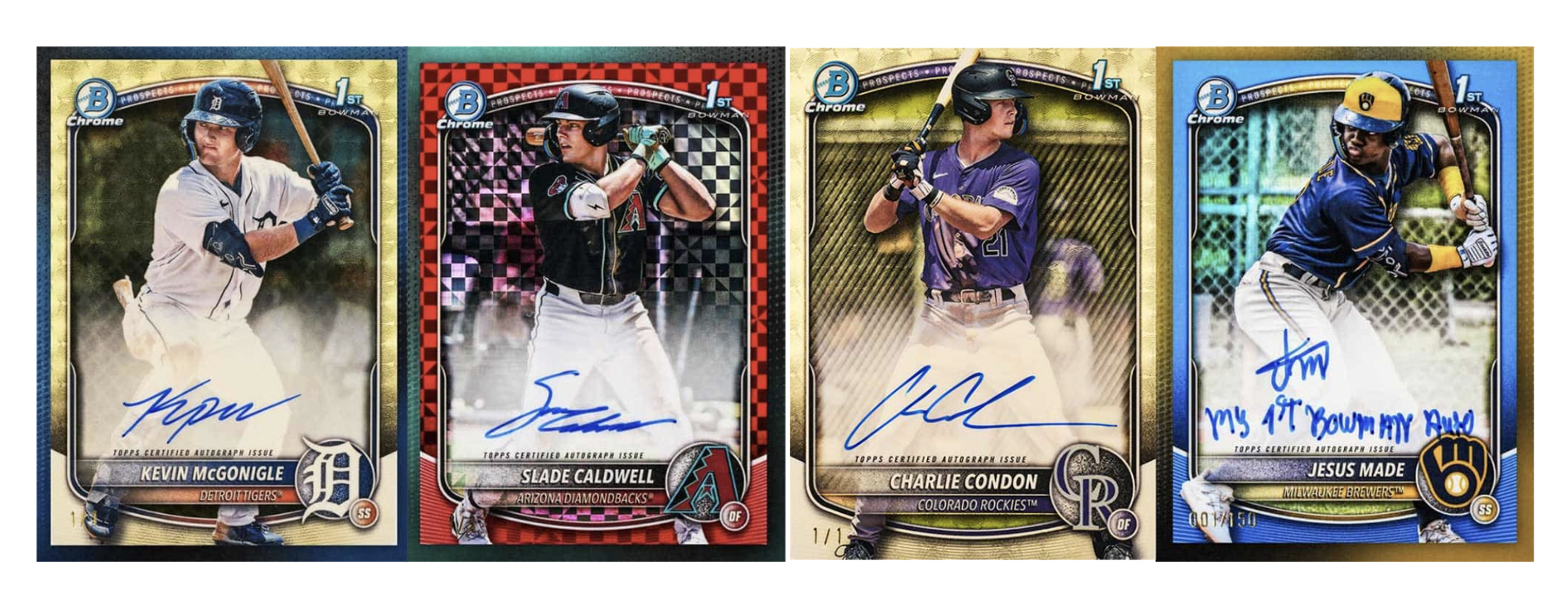

Many collectors are only vaguely aware of the PSA Set Registry. However, it is one of the most crucial elements in determining the prices of graded cards and the hierarchy between the grading companies. In this article, we will examine, the PSA Set Registry Guide effect.
In the past, collectors would often boast to their friends (and bored significant others) about having the best personal collection of their favorite player. But now, if you claim to have the world’s most impressive Jeff Kent collection, you better have receipts.
In 1998, PSA began to grade cards. Three years later, they set up an arena for collectors to authenticate and compare their collections. The PSA Set Registry Guide ranks niche personal collections and provides collectors with certified bragging rights.
There are currently 201,957 PSA registered sets. In the nature of PSA, the principal sets are sports cards. However, they have memorabilia and digital asset sets as well. Most notably, they take sporting events ticket sets quite seriously.
However, we are Cardlines and not Ticketlines. So, we will focus on the card stuff.
Registering your PSA set is free. But as we will see, it makes a ton of money for PSA and makes collecting more expensive for all of us.
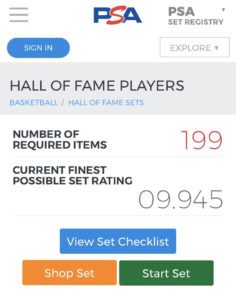
This an NBA Hall of Fame set is an example of the kind of sets featured on the PSA Set Registry.
To encourage collectors to participate, PSA offers annual awards to registered set collectors. In addition, the company scours the registered collections and hands out handy dandy engraved plaques. Every year, some of the sets PSA considers to be the best ones out there are entered into its “Hall of Fame.”
There are far too many to list, but here are the prominent awards in order of importance:
I am personally offended that there is no award for best soccer collection. But I digress.
PSA wants to get collectors more involved in the set registry and therefore encourages what it calls “gamification” of the process. The idea is to turn set completion into a game, triggering the endorphins that come with receiving rewards and competing.
To do that, PSA rewards achievements on four metrics:
Collectors reaching milestones on any of these metrics receive points and medals regularly. PSA is also promising “ tangible rewards in the future, after we roll out the program more fully.”
It is easy to see what PSA is doing here. They are creating an addictive and immersive experience that encourages hardcore collectors to rely on PSA-graded cards. And it works.

The leader board and awards turn the PSA Set Registry into a kind of addictive video game.
The PSA Registry has played an unappreciated role (no pun intended) in raising the prices of sports cards across the board. Creating leader boards and prize-based incentives made casual collectors deadly serious about completing sets and “defeating” rivals on the leaderboards.
They also put a premium on high-graded cards (as graded by PSA, of course). Why? Because PSA looks at the cumulative “GPA” of the ranking and not just completeness.
The PSA website describes the weight of card grades in the registry in the following way:
“Set rankings are determined by the grades of the items in the set, the “weight“assigned to each item in the set, and the set’s completeness. Each item within the set is assigned a weight based on the value of the item in NM-MT condition. For example, a 1952 Topps Mickey Mantle would have a much higher weight than a 1952 Topps common. If the set contains an ultra-rarity, the set may be broken down using a 1-10 scale, with 10 being the greatest weight. If the set has little variation in individual item prices, then the scale may be 1-5. Weighting for each set is viewable by clicking on the set checklist link found on each set page.”
The rating doesn’t just take into account how high the grades in your collection are. It also adds extra weight to the population reports. So how does it do that? The PSA website explains:
“Bonus points are issued to items listed in your set which are the highest graded with none graded higher. Items tied for the highest grade with none graded higher receive 1 bonus point. Items that are the single highest graded with none graded higher receive 2 bonus points.”
It is no coincidence that these rules and the popularity of the PSA Set Registry coincided with a massive rise in value for graded cards. It is also no coincidence that PSA-graded cards fetch higher values on the market.
Let’s take a look at how this works. One of the most popular baseball sets is the Hall of Fame Players – Post-War Rookies set. Completing the set requires acquiring specific rookie cards of each of the players selected to Cooperstown since 1945.
If you look at the leaderboard, the person with the “all-time finest’ set does not have the most complete collection. They are not even close. They have 75.93% of the cards in the set. Significantly less than anyone else in the top ten.
However, they invested heavily in difficult to purchase high-graded cards. As a result, they own the highest graded Yogi Berra and Stan Musial 1948 Bowman rookies, highest graded Mickey Mantle 1951 Bowman, and countless other jaw-dropping examples. Meanwhile, the second-place registry is 100% complete but only has a couple of the highest graded copies of pre-1970 cards (Willie McCovey and Jim Palmer, if you are curious).
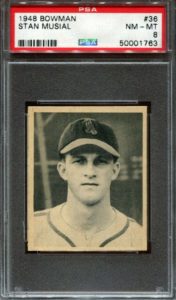
The leader in the post-war Hall of Famer list somehow got a PSA 10 version of this Stan Musial rookie (Picture taken from eBay).
These competitions play an important role in raising the value of graded cards. After all, the registry rewards those with the best-graded cards over the completists.
Not every set focuses on the marquee rookie cards. For example, the Andrew Benintendi Master Set. 24 collectors vie for the coveted title of the world’s finest Benintendi collector. Each esteemed contender, willing to do whatever it takes to achieve their dream. Or something like that.
Completing the set means buying no less than 968(!!!!) Benintendi cards. But to win, you want to get as many PSA 10s as possible. That puts a premium on low-pop cards like the 2018 Stadium Club Chrome Andrew Benintendi Gold.
Unfortunately, there are only 3 of them out there. So before you ask, no, I don’t have one. And whoever gets one has a leg up in becoming the ultimate Benintendi collector. So this nothing card is priced at $50.
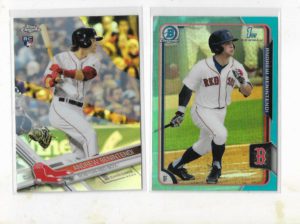
Turns out, Andrew Benintendi has a lot of cards (picture taken from eBay).
Beckett has a version of the registry, launched in 2011. However, there is no comparison in the size and importance of the two registries. While Beckett has 105,648 cards registered, PSA has over 200,000 SETS. Beckett entered the game too late and has fallen irretrievably behind in the registry race.
Even Beckett doesn’t seem to take its registry that seriously. As one Blowout Forum user wrote, “recently I emailed Beckett customer service about their graded registry contest (the page just says COMING SOON on their website). I received a response saying that they “may have some contest in the future, ” and that no details were available for now.
Therefore, Beckett sets are having a minimal influence on the marketplace. This factor is part of the reason PSA cards are generally worth quite a bit more.
If you wonder why common cards with high grades are so freaking expensive, here is your answer. A bunch of collectors is chasing the low pop high-graded PSA cards. This phenomenon also helps explain why PSA-graded cards fetch a premium in comparison to other companies.
In this way, the PSA registry is bumping up the price of their graded cards all across the board.
So sure, PSA makes collecting sets more addictive and fun by rewarding you with endorphins every step of the way. But the real winner is PSA and its profit margin.
2025 Topps All Star Game Mega Box Product Review
Ripping the new Topps All Star Game mega box.
Is this new sports card store the BEST VALUE around?
I Tested eBay Auction Promotions So You Don’t Have To!
I deep-dove on Fanatics Collect so you don't have to (but should you?)
Panini is launching a WNBA Product at $30,000!?
Topps Chrome 2024-25 Basketball: Honest Review and Notes
Did you know this SECRET about PSA slabs? #sportscard #tcg
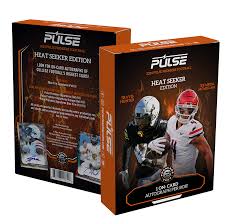
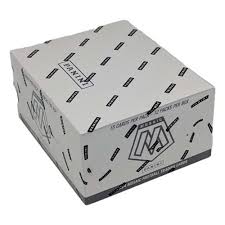
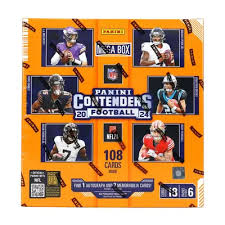
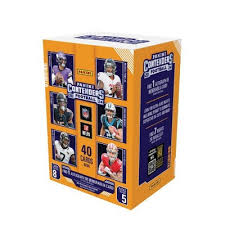
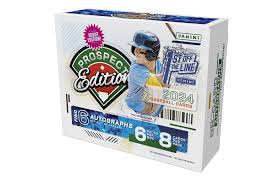
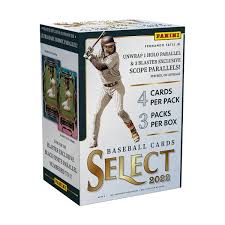
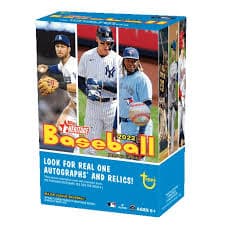
2022 Topps Heritage Baseball Blaster Box Configuration: 7 Packs per Box – 9 Cards per Box. Plus 1 extra pack.
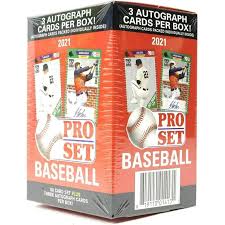
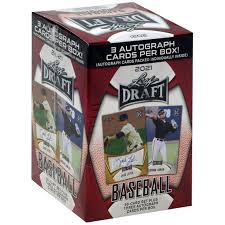
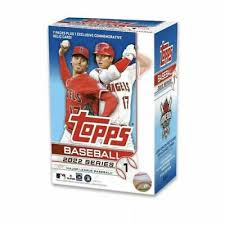
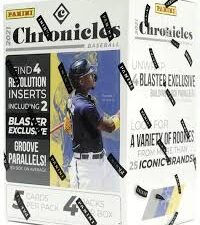
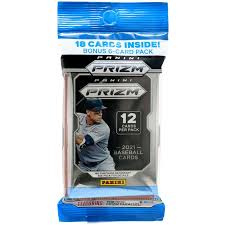
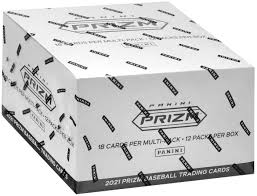

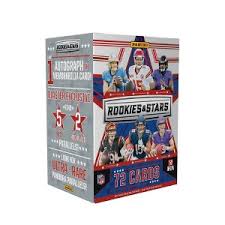
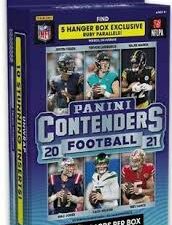
Keep up on breaking Sports Card News, our latest articles, product specials and exclusive content with expert analysis of hobby trends.

© Copyright 2025 - All rights reserved Cardlines.com / Media Techs LLC - Sports Card News, Reviews, Releases and BREAKS - #thehobby.
Important: When you click on links to various merchants on this site and make a purchase, this can result in this site earning a commission. Affiliate programs and affiliations include, but are not limited to, the eBay Partner Network.
The Ultimate 2024 Football Card Brand Tier List (Panini vs. Topps and more!)
Cardlines July 7, 2025 7:00 pm